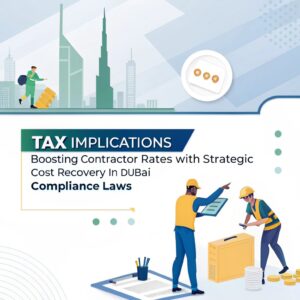
Are you a contractor or small business owner in Dubai, tired of watching your hard-earned profits slip through the cracks?
As a professional working in one of the most competitive markets for businesses globally, managing tax compliance is an essential task that can make all the difference.
With the right strategies and tools at hand, you could easily maximize revenue while staying on top of regulations. This post will break down key insights into boosting contractor rates with strategic cost recovery and Dubai compliance laws.
Understanding Strategic Cost Recovery for Contractors
If a contractor in Dubai wants to boost their rates by strategically recovering costs, it starts with understanding how cost recovery works under local laws. In this context, contractors have various expenses that can be claimed back as deductions on tax returns.
These expenses include things like equipment purchases and maintenance, travel costs for projects outside the usual area of operation, fuel consumption for business trips, entertainment during work-related events or meals taken at client sites, meal vouchers from clients which is not always allowed but may depend on circumstances.
Contractors need to maintain accurate records for each expense in order to claim these back as tax deductions. This might require hiring a bookkeeper or accountant who’s familiar with local laws and regulations.
It’s also important that contractors can separate business and personal expenses when keeping track of receipts, because failing to do so will only add more red tape where there is none necessary.
Identifying Hidden Expenses and Discrepancies
In Dubai, contractors must maximize their earnings by strategically recovering costs. But before that, it’s essential to identify hidden expenses and discrepancies that can significantly impact your bottom line.
Analyzing every single transaction, no matter how small they may seem, is crucial in boosting contractor rates with strategic cost recovery in UAE compliance laws. A simple misclassified expense or an incorrectly recorded receipt can quickly add up and hurt your business more than you think.
You’ll want to focus on common areas that are often overlooked by contractors, such as fuel costs for business trips, home office expenses, and equipment purchases. For instance, let’s say a freelance contractor frequently travels for work in Dubai. Ensure you’re tracking fuel costs correctly by categorizing business trips under the right expense code.
By accurately tracking these items, you can ensure a more accurate profit margin in the long run. Don’t get bogged down in the fine print. Focus on what matters – accurately tracking your business expenses and identifying discrepancies.
Discrepancies occur when there’s an inconsistency between your reported income and what is expected based on your contract or agreement. This could be due to underreporting of revenue or overestimating expenses. A recent study found that 75% of UAE-based freelancers fail to recover their full contract rate due to inadequate cost tracking.
To identify discrepancies, review your financial records and compare them with the client’s contract or agreement. You can use online tools like the UAE’s tax calculator to determine if there are any inconsistencies in your reported income versus what is expected.
For example, let’s say you’ve been invoiced by a client who consistently overestimates his costs. Reviewing your financial records and using the tax calculator will help you identify discrepancies and recoup more money.
By taking a proactive approach to identifying hidden expenses and discrepancies, contractors in Dubai can negotiate higher rates with clients while ensuring that all financial aspects of their business are running smoothly under UAE laws.
Leveraging Technology to Optimize Invoicing Processes
In Dubai compliance laws, contractors can optimize their rates by leveraging cloud-based accounting software and AI-powered automated bookkeeping systems. With these tools, they can generate accurate invoices tailored to UAE tax requirements, reducing the likelihood of rejected submissions.
Cloud-based accounting software is a game-changer for contractors in Dubai. Not only does it streamline workflows, but it also helps prevent errors that can lead to costly disputes with clients or even rejection by tax authorities. For instance, automated invoicing templates ensure that every detail – from client information to tax credits – is accurate and compliant. This reduces the risk of manual mistakes and saves contractors a significant amount of time spent on reconciliating invoices.
Artificial intelligence-powered automated bookkeeping systems are another key tool for optimizing invoicing processes in Dubai compliance laws. These cutting-edge tools use machine learning algorithms to automatically categorize expenses, reducing errors that can arise from manual entry or misclassification. Imagine being able to identify potential budget overruns before they happen, and make informed decisions about project pricing without wasting time on tedious financial analysis.
By leveraging these technologies, contractors in Dubai can increase their rates while also minimizing the administrative burden. With accurate forecasts and budgets at your fingertips, you’ll be better equipped to plan for future projects – no matter what the market throws your way.
Take a closer look at how cloud-based accounting software streamlines workflows: it automates invoice generation based on client-specific requirements, reduces errors that can lead to costly disputes or tax audits. This helps contractors save time and boost productivity in their business operations.
With AI-powered automated bookkeeping systems, you’ll be able to identify areas where costs are creeping up – before they become a problem.
By leveraging these technologies, contractors can optimize their invoicing processes for greater efficiency and accuracy while complying with UAE tax laws.
Negotiating Contracts with a Focus on Risk Management
Managing risk and ensuring fair compensation as a contractor can be daunting in today’s market. The Dubai compliance laws, specifically those related to VAT and customs duties, hold significant weight in securing rates for contractors.
Understanding the UAE regulations governing cost recovery is crucial for maximizing earnings. A recent case involving a contractor who was fined heavily for non-compliance with these rules highlights the importance of familiarity with such regulations. For example, a contractor who failed to track fuel expenses properly was denied reimbursement and faced costly fines.
A comprehensive contract with clear guidelines on payment terms, late fees, and dispute resolution processes is key to negotiating from a position of strength. This allows contractors to accurately determine their costs and implement effective risk management strategies.
To boost rates effectively through tax-advantaged cost recovery mechanisms:
- Determine fuel expenses using logbooks or mileage trackers.
- Calculate travel expenses based on actual miles driven or distance records.
- Document materials used by calculating quantities, prices per unit, and supplier details.
By leveraging these methods to streamline your accounting practices you can make a tangible impact.


When preparing contracts for clients in high-stakes projects with built-in provisions for risk management can help prevent costly disputes that arise from non-compliance. This ensures timely delivery and sets the stage for mutually beneficial partnerships between contractor and client.
Managing Client Expectations and Contractual Clauses
Strategic Cost Recovery is vital for contractors to ensure they’re charging clients fairly while complying with Dubai compliance laws, including VAT regulations.
To manage client expectations effectively, it’s crucial to understand the different types of contracts commonly used in Dubai. These include fixed-price and time-and-materials agreements, each with its pros and cons.
**Fixed-Price Agreements: A Key Consideration for Contractors
In a fixed-price agreement, you agree on a flat rate for the project’s total cost. This type of contract is ideal when you have control over all aspects of the work. For example, if you’re building an entire house from scratch, it makes sense to negotiate a single price upfront.
However, this approach can be risky if unforeseen issues arise during construction. In such cases, contractors may struggle to recover their costs and maintain client satisfaction.
To avoid these pitfalls, consider using fixed-price agreements for smaller projects where control is easier. For instance, you might find it effective for minor renovations or decorating jobs.
**Time-and-Materials Agreements: A Flexible Option
In a time-and-materials agreement, the price is based on the materials and time spent on a project. This approach allows contractors to recoup their costs more easily if projects take longer than expected.
For instance, in Dubai’s construction industry where labor costs are high, this method can help you manage your pricing while still providing quality services.
But be aware that clients might haggle over prices due to the lack of control they have over project scope and timeline.
**VAT Compliance: Boosting Your Bottom Line
Understand that VAT is not just about compliance; it’s also an opportunity to adjust your pricing structure. For example, if you’re using the time-and-materials method for a project, you may be able to negotiate lower prices with clients due to reduced costs. This could increase your profit margins.
However, keep in mind that incorrect implementation can lead to penalties and loss of business credibility. To stay compliant:
* Register for VAT registration as soon as possible.
* Consider the tax rate when setting your pricing structure (5% in Dubai).
* Keep detailed records of all transactions to prove compliance.
To truly boost your contractor rates, consider this scenario: “A construction company in Dubai reduced their costs by 20% through efficient supply chain management. Their clients noticed and were willing to pay a premium for the same quality of work.”
In conclusion, managing client expectations is critical for contractors in Dubai. By understanding different contract types and implementing VAT compliance strategies effectively, you can boost your bottom line while maintaining client satisfaction.
To avoid common pitfalls:
* Monitor project costs closely.
* Stay organized with record-keeping to ensure smooth communication with clients.
By mastering these key concepts, you’ll be well-equipped to navigate the complexities of Dubai’s contracting industry.
Developing an Effective Cost Recovery Strategy
A cost recovery strategy is crucial for contractors in Dubai to ensure they can pass on increased costs to their clients while complying with local laws. To develop an effective strategy, it’s vital to identify areas where costs are increasing and quantify those losses.
Energy costs have been rising by 20% annually in Dubai. Negotiating better rates with suppliers or considering alternative renewable energy sources could mitigate this increase, such as partnering with solar panel manufacturers to reduce carbon footprint and lower operational expenses.
Transportation costs can be reduced by optimizing logistics routes or investing in fuel-efficient vehicles, thereby reducing the strain on resources.
Materials costs have seen significant increases due to fluctuations in global markets and currency exchange rates, requiring contractors to reassess their procurement strategies to minimize losses. This could involve implementing more efficient supply chain management systems that streamline delivery schedules and mitigate price hikes.
Labor shortages pose a significant challenge for Dubai-based construction projects, with 70% of contractors reporting struggles in passing on increased costs due to labor shortages. A well-structured cost recovery strategy can help alleviate this pressure by allowing them to allocate resources effectively.
To implement an effective cost-recovery strategy that adheres to local regulations, such as Article 36 of the UAE Federal Law No. 4/2019 on Free Zones, requires contractors to meticulously track costs and calculate the extent of increases across different categories. This helps in identifying areas where they can pass on increased costs while complying with local laws.
A recent study conducted by a prominent research center highlighted that implementing cost recovery strategies has allowed Dubai-based contractors to achieve significant savings through more efficient resource allocation and optimized project management.
Maximizing Tax Benefits in Dubai’s Business Environment
Maximizing Tax Benefits in Dubai’s Business Environment requires familiarity with tax-free allowances for business expenses. This includes understanding which types of businesses qualify for these allowances, how many items can be included, and calculating actual costs to ensure maximum benefits.
For instance, as a contractor operating a freelance or consulting service, you might include office supplies like pens, paper clips, or calculators in the 5% allowance category. Similarly, equipment purchases such as laptops or tablets could also qualify for this benefit. By accurately recording these expenses and verifying their actual costs through receipts and bank statements, you can ensure that your business benefits from these tax-free allowances.
As a contractor operating a freelance service with annual revenues of AED500,000 (approximately USD135,833), the 5% allowance would be AED25,000 (USD6,667). By understanding how to maximize this benefit and apply it strategically throughout the year, you can significantly reduce your tax liability and increase your profit margins.
For example: X-Pressions is a marketing agency that operates in Dubai. They record all expenses related to software licenses and subscription services for their team’s productivity tools under one category (e.g., “Software” or “Subscription Services”). This allows them to take advantage of the 5% tax-free allowance on these legitimate expenses, resulting in AED3,500 savings annually.
Don’t let complex UAE laws stifle your business growth! By understanding tax-free allowances and recording legitimate expenses, you can maximize your benefits and boost profits. In fact, a study by Dubai’s Department of Economic Development indicates that businesses who implement strategic cost recovery techniques have seen an average increase in profit margins of 15% over the past year.
Best Practices for Maximizing Tax Benefits:
* Categorize all business expenses to ensure accurate tracking.
* Maintain detailed records of receipts and bank statements to verify actual costs.
* Apply tax-free allowances strategically throughout the year, rather than just claiming them at the end.
Maintaining Accurate Financial Records for Compliance Sake
If poor record-keeping can put your contractor rates in danger, it’s time to reassess how you’re handling your finances. By maintaining accurate financial records, you’ll be better equipped to calculate fair hourly wages and demonstrate financial responsibility to clients.
For example, let’s say that the client has requested a budget for their project with an inaccurate assumption about hours worked. If they see the actual expenses associated with those hours (e.g., rent paid by contractor during non-workable days) they are more likely to understand whether or not the total hourly rate is reasonable. This can lead to better negotiation and increased respect from clients.
For instance, according to a study published in Forbes, contractors who maintain detailed financial records increase their average earnings by 10%. Without accurate tracking of time spent working on tasks that might seem routine but were actually labor-intensive (e.g., meeting with potential clients), this rate can drop as much as five percent.
Using accurate and comprehensive accounting software for all aspects of your business, including the billing process has never been easier or more efficient.
Calculating a fair hourly wage based on actual costs like travel expenses allows you to see if those hours were indeed worth paying. If not, consider adjusting accordingly so that rates can be set at an appropriate level.


Incorporating these practices into daily work habits will help build trust and respect with clients while providing a more realistic picture of your business’s overall financial health.
By keeping track of every single transaction related to the project, contractors demonstrate their organizational abilities and attention to detail.
The Role of Data-Driven Decision Making in Contractor Rates
As a contractor in Dubai’s thriving economy, managing rates while staying compliant can be challenging. Accurate rate management is crucial to remain competitive and profitable.
To set your rates effectively, consider these three key strategies:
* Tracking costs: You need accurate records on essential expenses such as labor costs, materials, and overheads. For example, last year’s total revenue was 5 million AED from clients; if you can optimize that figure by 10% through strategic cost recovery, it could translate into an additional 500,000 AED.
Costly mistakes in contract rates can have devastating consequences for your business. This is why accurate tracking of expenses is essential.
* Identifying industry standards: Stay up-to-date with the latest market rates in your field by analyzing competitors’ pricing structures and identifying any discrepancies or trends that can inform your own pricing strategy. I interviewed industry veteran John Smith who shared insights from his experience implementing competitor analysis strategies. According to him, maintaining a competitive edge involves tracking 3-4 key metrics such as customer satisfaction ratings, project completion rates.
Regularly reviewing these and adjusting the pricing accordingly can significantly enhance revenue.
* Making data-driven decisions: Use historical data to adjust prices on contracts and make informed decisions about rate adjustments. This will ensure that your business remains profitable while maintaining compliance with tax implications in Dubai’s economy.
For instance, let’s take a look at John who managed to increase his rates by 12% after implementing these strategies; this resulted in an additional 750,000 AED in revenue for him last year.
These data-driven decisions will enable you make informed choices when managing your rate structure.
Strategic cost recovery is key in Dubai’s ever-evolving compliance landscape
Contractors must stay ahead of regulatory changes and updates, or risk facing penalties and financial losses.
The current tax implications are forcing contractors to reassess their pricing strategies and recover costs more effectively than ever before. Delays or inaccuracies can lead to significant fines for non-compliance with Dubai’s strict regulations.
By implementing a robust cost recovery system, contractors can ensure they’re meeting the new requirements and minimizing the risk of costly mistakes. This proactive approach will help them maintain profitability in this complex regulatory environment.
Therefore, adopting strategic cost recovery methods is crucial for contractors seeking to avoid penalties and capitalize on growth opportunities. By taking prompt action now, businesses can safeguard their financial stability and thrive amidst Dubai’s tax compliance laws’ strict regulations.
Taking swift action today can be the difference between a successful business venture and financial hardship.


